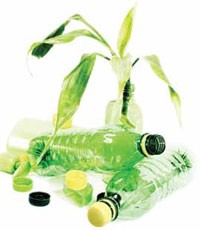Growing Plastic

By Michele Cervi
It takes an estimated 200,000 barrels of oil a day to produce the conventional plastic containers used for food and consumer goods in the United States. While some of these plastics are recycled, large amounts of them wind up in landfills, where the polymers that give plastics their durability prevent the items from naturally breaking down. Plastic shopping bags create about 300,000 tons of landfill waste each year.
As disposal sites continue to fill up and the supply of petroleum they are derived from shrinks, bioplastics are emerging as a viable alternative. The building blocks for your next take-out container just might be growing in a cornfield in Iowa or the lush sugarcane farms of Brazil.
More and more packaging materials are being manufactured from plant-based plastics, with corn and sugarcane leading the pack of eco-friendly starting points. Chemists are converting sugars from sugarcane into polyethylene terephthalate plastic, which can be used in the manufacture of clear plastics most commonly used for beverage bottles. Corn can be soaked, ground and combined with enzymes to produce dextrose. This simple sugar is then fermented into lactic acid in a process similar to the way beer is produced. The lactide molecules then form polymer chains that can be used as the basis for bioplastics.
While bioplastics offer some obvious advantages, such as a renewable source, they also present some challenges. Bioplastics generally have a lower melting point than their traditional counterparts, and although they contain biodegradable components, some can contaminate recycling efforts if intermingled with conventional plastics.
Colas and Ketchup Going Green
Some of America's most popular brands are experimenting with bioplastic packaging. The Coca-Cola Co. and H.J. Heinz Co. have introduced the PlantBottle, which they use in beverage bottles and squeezable ketchup containers. Up to 30 percent of the PlantBottle is derived from plant-based material and it can be recycled. During 2011, PepsiCo announced it had found a way to create a bottle entirely made from plant waste.
Classroom Discussion
- Bioplastics must still be manufactured. What are the environmental costs?
- What are the best uses for bioplastics? When might bioplastics not be the best option?
- Would you be more or less likely to buy a product made from bioplastics? Why?